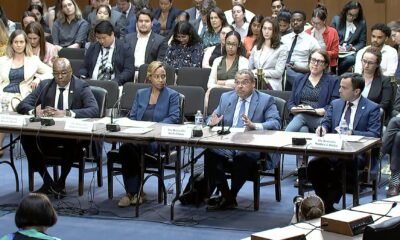Donald Trump
AGs Take Action: Lawsuit Filed Against Trump Administration for Cutting Billions in Funded Aid

In a significant legal action, 20 Democratic attorneys general, including Arizona’s Kris Mayes, are challenging sweeping cuts to federal grants under the Trump administration. Filed in U.S. District Court in Massachusetts, the 80-page complaint criticizes the administration’s interpretation of a crucial five-word section of federal regulations, alleging it justifies a “nationwide slash-and-burn campaign” that has abruptly terminated billions in funding for state and local governments, research institutions, and universities.
The rule from the U.S. Office of Management and Budget states that federal agencies can cut grants if they no longer achieve program goals or agency priorities. However, the Trump administration has interpreted a segment of this regulation to mean grants can be terminated simply if an agency changes its mind.
The lawsuit claims, “Agency Defendants now assert—for the first time— that the Clause means something completely new: that it permits agencies to terminate grant awards when the agency simply changes its mind.” This interpretation has been used in various orders and memos since the initial directive to the Department of Government Efficiency.
Defendants in the case include prominent figures such as U.S. Office of Management and Budget Director Russell Vought and U.S. Secretary of Agriculture Brooke Rollins, among others from different departments.
In a statement, Mayes criticized the “slash-and-burn approach,” emphasizing that these cuts harm crucial projects across Arizona, from infrastructure to job training and university research. “President Trump cannot illegally and arbitrarily rip away funding Arizonans rely on,” said Mayes, reflecting the urgent tone of the lawsuit.
The complaint highlights several dire consequences stemming from these abrupt cuts, such as losing habitat restoration efforts in Maine and ending programs to combat hate crimes in New Jersey. The lawsuit also notes the impact on initiatives addressing food insecurity, public health, and access to unemployment benefits.
In Arizona, specific cuts include three U.S. Department of Labor grants leading to layoffs of 500 workers and over $8 million in EPA funding for the Board of Regents. The ongoing risk to remaining federal aid threatens support for vulnerable populations and essential public services.
The attorneys general argue that the administration’s actions violate the Administrative Procedures Act and seek a court ruling to confirm that federal agencies do not have “unfettered power” to terminate previously awarded funding. They request a clarification of the regulations, applicable to all future grants if granted.
While the U.S. Department of Justice, representing the federal agencies, declined to comment on the ongoing lawsuit, the coalition of attorneys general includes representatives from multiple states, bringing together voices from California to New York in this pivotal fight.


















